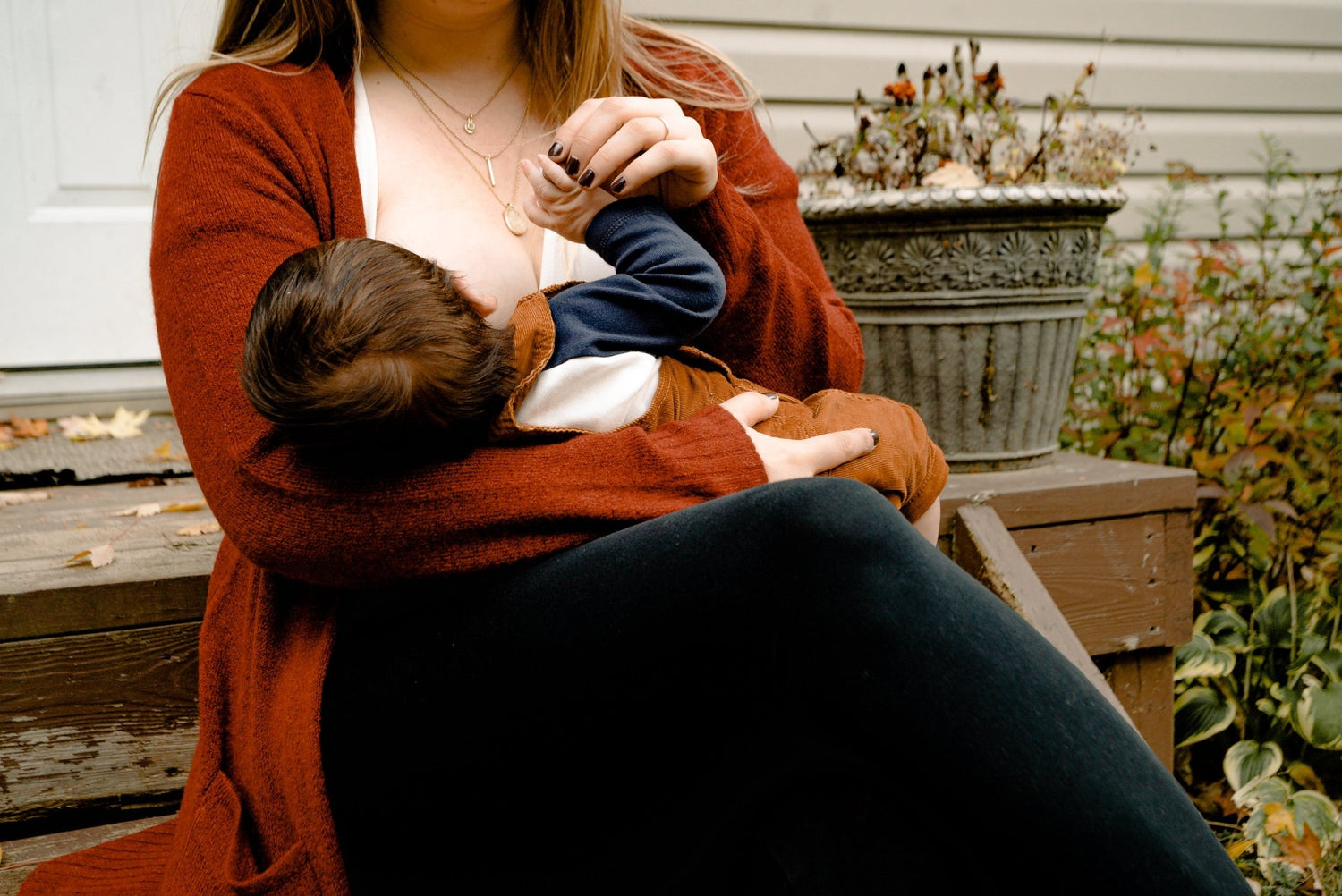Breastfeeding: good or bad?
“Don’t start breastfeeding your baby to sleep!” Something like this is well-intentioned advice that many mothers receive when their baby is born. The underlying assumption is that breastfeeding is a bad habit. At the same time, many mothers enjoy these intimate moments in which their baby falls asleep quietly on the breast. Maybe this sounds familiar and you're wondering what's right. Is breastfeeding good or bad?
| Table of contents: |
1. What is breastfeeding?
It's very easy for newborns to nod off while breastfeeding. After all, drinking from the breast is still very strenuous in the first few weeks. The little baby can also calm down by sucking. This often develops into a ritual that is maintained even when the baby is older. Breastfeeding helps babies fall asleep and that's exactly what breastfeeding is: a sleep aid.
2. Why does breastfeeding work so well?
Many mothers experience how quickly their babies relax and fall asleep while breastfeeding. From an evolutionary perspective, physical contact with its parents is simply essential for a baby's survival. After all, our ancestors did not live in safe houses but were exposed to many threats from animals or environmental influences. A baby would not have survived long alone in this environment. Breastfeeding meant, above all, safety: the baby felt protected and warmed by direct physical contact with its mother and was also satiated and calmed. These primal instincts are still active in our babies today. So it's understandable that babies relax when breastfeeding. After all, they receive everything they need to say goodbye to sleep well: closeness, warmth, food, safety and security.
Another reason why breastfeeding works so well is the composition of breast milk. It contains, among other things, trytophan, which is converted into melatonin in the child's body. Melatonin is a hormone that promotes sleep.
Many mothers find breastfeeding to fall asleep to be comfortable and uncomplicated. So if you feel comfortable with it, just enjoy this intimate time with your baby.
3. Does breastfeeding have any disadvantages?
To make one thing very clear: Breastfeeding, including breastfeeding, does not harm any child. From the previous paragraph you know the evolutionary biology view of breastfeeding to sleep. But how does psychology assess this topic? From the perspective of the behaviorist model, it is considered learned behavior if a child cannot fall asleep without the help of their parents. The child associates breastfeeding with falling asleep. A so-called sleep association arises. This applies not only to breastfeeding, but also to other sleep aids, such as carrying or rocking on the Pezziball.
In fact, a child gets used to falling asleep on the breast. The longer this habit is maintained, the more it becomes entrenched. This applies equally to all sleep aids. But that doesn't mean that this habit won't disappear and can be replaced by another one. This process of habituation, weaning and detachment is a normal development in babies and toddlers, which you will also encounter in many other areas.
Many children who are breastfed to sleep are also breastfed back to sleep at night to continue sleeping. This is not a disadvantage for the child's development. In fact, regular breastfeeding ensures good weight gain. Another question is whether the mother perceives nighttime breastfeeding as a burden. The sleeping rhythm of the breastfeeding mother often adapts to that of her child, so that she wakes up shortly before the baby and is not woken from a deep sleep. If mom and baby sleep close to each other, many moms don't wake up at night when their child wants to breastfeed. But there are also mothers for whom nighttime breastfeeding is not so relaxed and is then perceived as a burden. So it's also about an individual feeling, which can vary from mom to mom.
There is often a fear that by breastfeeding the baby to sleep, only the mother can put the baby to bed. Of course, it is easiest for a child who has been breastfed to fall asleep on mom's breast as usual. If he tries to fall asleep in a different way, it will be more difficult for him. However, it is possible that it also finds its way to sleep in a different way with another attachment figure. One option, for example, could be to carry the baby to sleep close to your body.
4. When will breastfeeding be stopped?
At some point in every breastfeeding relationship there comes a time when it comes to an end. In some cases the child makes the decision to no longer want to breastfeed, in other cases the mother ends the breastfeeding relationship. It is important that as a mother you can stop breastfeeding at any time if it no longer feels good to you or even becomes a burden. No mother has to continue breastfeeding and endure stress or even physical pain for fear that her child will be harmed. Your own child can only be well if the mother is also well.
By the way, stopping breastfeeding to sleep does not automatically mean that the entire breastfeeding relationship comes to an immediate end. However, the age of the child is crucial. The natural weaning process usually begins when the child eats large amounts of solid food. Breastfeeding is often the last thing children give up. Only when the milk meals have already been replaced by porridge or solid food does the cessation of breastfeeding gradually mean the end of the breastfeeding relationship.
If you are considering stopping breastfeeding, be aware that, in most cases, a change that does not come from the child will not come without protests and tears. This is understandable because your child doesn't understand why they should give up a favorite sleep aid. In this case, it is important to take your child's displeasure seriously and support his or her feelings. Before you start to stop breastfeeding, you should also be really sure about your decision. This way you can help your child find a new way to sleep with a clear inner attitude. So think about what this path might look like before you start. Many children are helped by closeness and cuddling. But also think about what else will help your child calm down.
Getting used to daycare or with a childminder should not be a reason to stop breastfeeding. Most children are able to distinguish between different situations when falling asleep and will find a different way to sleep at daycare or with their childminder if they are mature enough and are lovingly accompanied by their teachers.
5. Do children sleep through the night once they are no longer nursed to sleep?
A common myth is that children sleep through the night as soon as they stop breastfeeding. This myth persists, but it is wrong. We all wake up when we move from one sleep cycle to the next. We adults have learned to just keep sleeping. Children often still need the support of their parents. As soon as breastfeeding is no longer an aid to falling asleep (again), your child will need other strategies to get back to sleep. How much a child needs its parents depends on its individual development and how well its self-regulatory abilities are developed. Ie how well a child is able to calm themselves.
Guest article by Jana and Linda from Schlaf gut Mini:
Instagram: schlafgutmini_babyschlaf
Website: www.schlafgutmini.de





